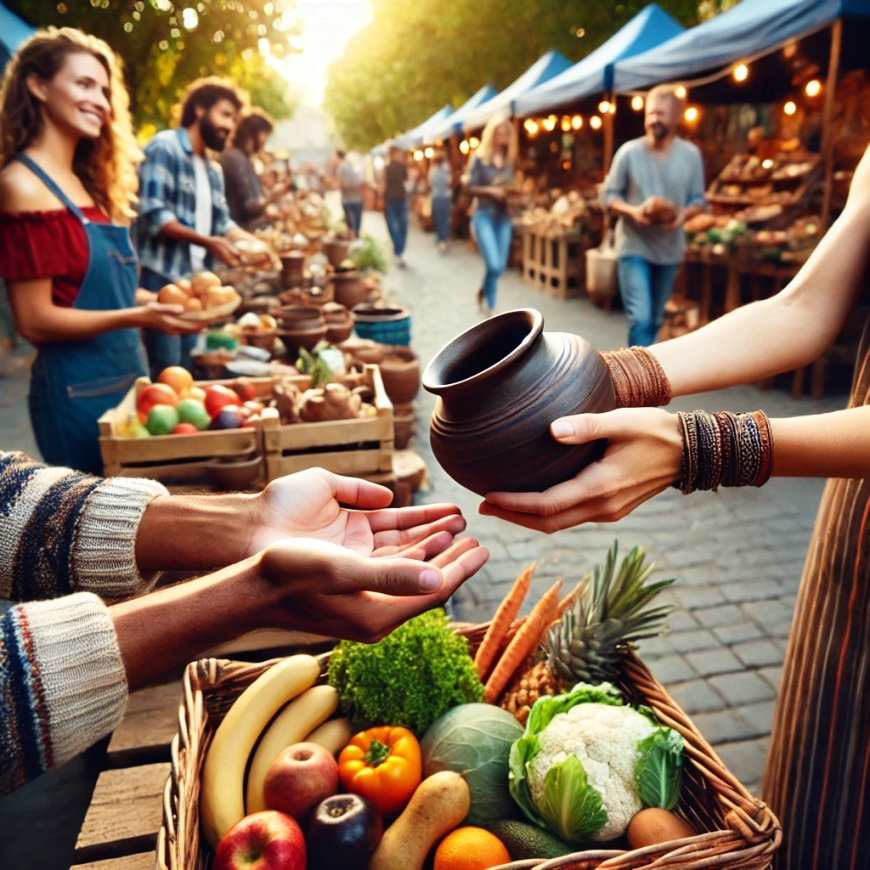The Rise of Barter Systems in the Modern Economy: Exchanging Goods for Goods
Explore the growing trend of barter systems in today's economy, where goods and services are exchanged directly without money.

In today’s fast-paced, technology-driven world, the concept of barter systems is making a notable comeback. While money has been the primary medium of exchange for centuries, exchanging goods for goods without involving cash is increasingly gaining traction. This rise of barter systems in the modern economy reflects a shift towards alternative trade practices that prioritize sustainability, community building, and financial independence. But what’s driving this resurgence, and how is it transforming the way we think about commerce?
The History of Bartering
Before the advent of money, barter goods and services were the primary method of trade. Early human societies relied on simple exchanges: one person would offer food, clothing, or tools in return for something they needed. This system worked well as long as both parties agreed on the value of what was being exchanged. However, as societies grew larger and trade networks expanded, bartering goods became increasingly complex, eventually giving rise to the need for money as a universally accepted medium of exchange.
Despite the development of currency and modern financial systems, the idea of exchanging goods for goods never fully disappeared. In fact, in many communities around the world, bartering remained a vital practice, especially in times of economic hardship or in regions where money was scarce. Today, as we face global challenges such as inflation, economic inequality, and environmental degradation, barter goods and services are experiencing a resurgence, especially in localized and digital communities.
Why is Bartering Becoming Popular Again?
The rise of barter systems in the modern economy is a response to several contemporary factors. Let’s explore why more people are turning to exchanging goods without involving money:
1. Economic Uncertainty
As global economies become more volatile, people are seeking ways to protect themselves from inflation, currency devaluation, and financial instability. Exchanging goods for goods offers a way to circumvent the volatility of traditional currencies. By engaging in barter, individuals and businesses can continue to meet their needs and trade valuable resources without depending on unstable financial systems.
During times of recession or financial crises, barter systems often flourish. People realize that their goods or services hold intrinsic value, regardless of the currency in use. For example, someone might trade fresh vegetables for a plumber’s services, or a freelance graphic designer might exchange their skills in return for a week’s worth of groceries.
2. Sustainability and Environmental Concerns
In an age where sustainability is at the forefront of global discussions, many individuals and businesses are looking for ways to reduce waste and minimize their carbon footprint. Exchanging goods without money often promotes a circular economy, where products are reused, repurposed, and recycled.
By bartering, people are less likely to buy new goods, reducing consumption and supporting a more sustainable way of living. Bartering goods also reduces the demand for mass production, which is often responsible for overconsumption of natural resources. Whether it’s trading clothing, furniture, or household items, the act of exchanging goods for goods helps decrease the overall environmental impact associated with traditional consumerism.
3. Building Stronger Community Ties
Barter systems are not just about trade; they also foster a sense of community. In a world where people are increasingly disconnected from their neighbors, exchanging goods with each other creates opportunities for face-to-face interactions and relationship building. When individuals and businesses engage in bartering, they are not only trading goods but also strengthening social networks and creating a sense of trust within their communities.
For example, local barter networks have emerged in many urban and rural areas, where people exchange everything from homemade food to gardening tools. These networks allow individuals to meet their neighbors, collaborate on projects, and support local initiatives. In essence, bartering turns trade into a social experience, one that is rooted in cooperation and shared values.
4. Digital Barter Platforms
The rise of the internet and digital platforms has played a significant role in the resurgence of bartering. Online barter systems allow people to exchange goods with someone else across the globe, making it easier than ever to find a trading partner and arrange exchanges. Websites, apps, and social media groups dedicated to bartering have connected millions of people, allowing for the exchange of everything from services and products to knowledge and skills.
These platforms make it simple to trade and ensure transparency, which helps mitigate the potential pitfalls of traditional bartering. Whether through established sites like Craigslist or specialized barter communities, technology has made exchanging goods for goods more accessible and efficient than ever before.
Read More Blog:- The Ultimate Guide to Barter Exchange goods without involving money
5. Promoting Financial Independence
For many, bartering offers an escape from the constraints of traditional monetary systems. As the cost of living rises, wages stagnate, and financial debt accumulates, bartering provides a way to meet daily needs without spending money. In fact, for some, exchanging goods without money has become a lifestyle choice—an attempt to live outside the financial pressures of mainstream society.
By adopting a barter lifestyle, individuals can reduce their reliance on jobs, banks, and credit systems. This fosters greater independence and self-sufficiency, with people being able to trade their skills and resources in exchange for what they need. For example, a skilled carpenter might exchange furniture-making services for fresh produce or home repairs, effectively reducing reliance on traditional currency.
Bartering in the Modern World
So, how can you get involved in this growing trend? Here are a few ways to start exchanging goods with each other:
-
Join Local Barter Groups: Many communities have local barter groups or exchanges. These can be found through social media or community bulletin boards. Whether you’re offering professional services or household items, local barter groups make it easy to connect with others who want to trade.
-
Use Online Platforms: Websites like SwapRight or BarterQuest are designed to facilitate the exchange of goods and services online. These platforms allow you to list items you want to trade and browse what others are offering.
-
Barter for Services: If you have a particular skill—whether it’s cooking, graphic design, or car repair—you can offer your services in exchange for goods. Many businesses are also open to bartering, offering their products or services in return for something of equal value.
-
Organize a Barter Fair: If you want to take things a step further, consider organizing a barter fair. These events bring together individuals who want to exchange goods and services and provide a fun, community-oriented way to barter.
Conclusion
The rise of barter systems in the modern economy reflects a growing desire for financial independence, sustainability, and stronger community ties. Exchanging goods for goods without the involvement of money offers numerous benefits, from reducing environmental impact to providing a more reliable and flexible way to trade. As the world faces economic challenges and increasingly uncertain futures, bartering provides a resilient, time-tested alternative to traditional financial systems. Whether through local networks or online platforms, the age-old practice of bartering is experiencing a modern revival—helping individuals, businesses, and communities thrive in a rapidly changing world.
So, why not start exchanging goods with someone else today? You might be surprised by what you can gain from a good trade!
What's Your Reaction?



















